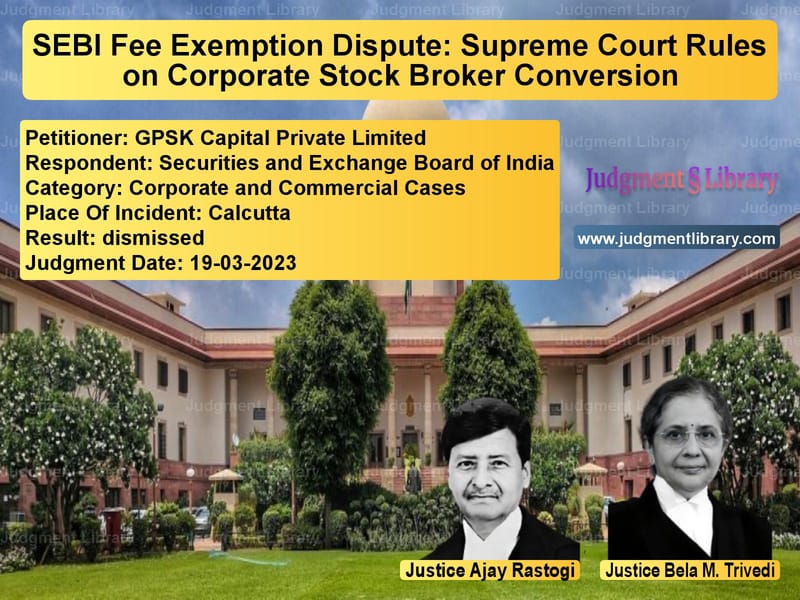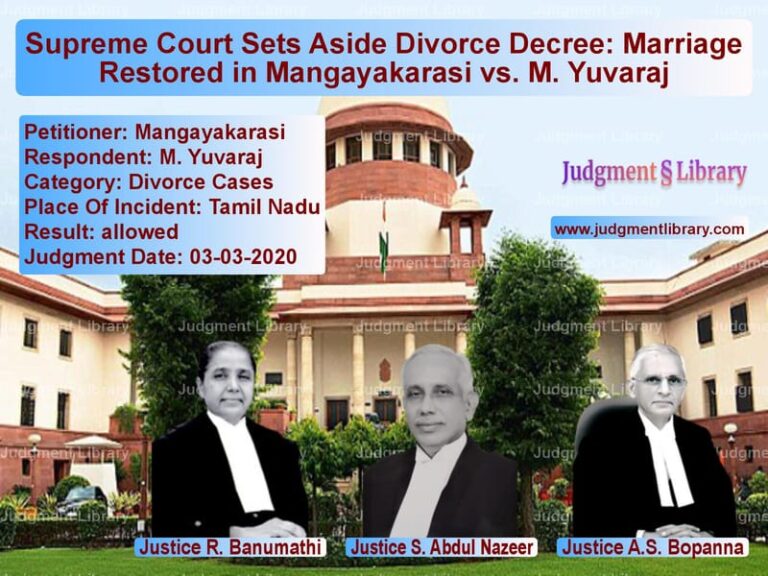SEBI Fee Exemption Dispute: Supreme Court Rules on Corporate Stock Broker Conversion
The Supreme Court of India recently adjudicated a dispute regarding the exemption of registration fees under the Securities and Exchange Board of India (SEBI) regulations. In the case of GPSK Capital Private Limited v. Securities and Exchange Board of India, the Court examined whether a corporate entity formed by the conversion of an individual stock broker’s membership could claim exemption from registration fees already paid.
Background of the Case
The dispute arose when GPSK Capital Private Limited (formerly Mantri Finance Limited) sought an exemption from SEBI registration fees, arguing that its predecessor, Srikant Mantri, had already paid them. Mantri had initially operated as an individual stockbroker with the Calcutta Stock Exchange (CSE) before transferring his membership to the corporate entity. The company asserted that it met the requirements under Clause 4 of Schedule III of the SEBI (Stock Brokers and Sub-Brokers) Regulations, 1992, which allows fee exemptions in cases of conversion.
Petitioner’s Arguments (GPSK Capital Private Limited)
The appellant company contended:
- That it was entitled to claim exemption from SEBI fees under Clause 4 of Schedule III since its formation resulted from the conversion of an individual brokerage into a corporate entity.
- That Srikant Mantri was initially a registered individual broker and his membership was seamlessly transferred to the newly formed corporate entity.
- That SEBI’s policy encouraged corporatization, and its refusal to grant an exemption was contrary to the intent of the regulations.
- That the Securities Appellate Tribunal (SAT) and SEBI had misinterpreted the conditions necessary for fee continuity.
Respondent’s Arguments (Securities and Exchange Board of India)
SEBI, represented by its legal counsel, countered:
- The exemption applies only when an individual stockbroker converts into a corporate entity, not when a membership is transferred to an existing corporate entity.
- Srikant Mantri had merely transferred his CSE membership card to an already registered company, rather than forming a new corporate entity as per SEBI’s intent.
- For exemption, the original broker (Mantri) must have remained a whole-time director and held at least 40% of the paid-up equity capital in the corporate entity for three years, which was not satisfied.
- There was no legal basis for extending the exemption since the appellant had failed to provide evidence of fulfilling these conditions.
Supreme Court’s Judgment
The Supreme Court bench, comprising Ajay Rastogi and Bela M. Trivedi, upheld SEBI’s stance and dismissed GPSK Capital’s appeal. The Court ruled:
“The exemption from payment of fees confers a benefit to the corporate entity. For granting such benefit, the conditions subject to which such benefit is available need to be established beyond doubt.”
The Court observed that:
- The transfer of membership was not equivalent to a formal conversion under SEBI regulations.
- Srikant Mantri had not maintained the required 40% equity holding in the corporate entity.
- Annual returns and official filings indicated that Mantri was only a director and not a whole-time director, violating SEBI’s conditions for exemption.
- Clause 4 of Schedule III was introduced to encourage corporatization, but its benefits could only be granted if all stipulated conditions were met.
As a result, the Court upheld SEBI’s rejection of the fee exemption and reaffirmed that stock brokers must comply strictly with regulatory conditions to avail themselves of such benefits.
Implications of the Judgment
The ruling has important implications for stock brokers and financial institutions:
- Transfers of stock exchange memberships to existing corporate entities will not qualify for SEBI’s fee exemption.
- Stock brokers seeking exemption must ensure compliance with SEBI’s conditions, including maintaining control and shareholding requirements.
- The judgment reinforces SEBI’s authority in enforcing regulatory compliance and discourages attempts to bypass fee obligations.
Conclusion
The Supreme Court’s ruling in GPSK Capital Private Limited v. SEBI sets a critical precedent for interpreting SEBI’s fee exemption policies. It clarifies that exemptions under Clause 4 of Schedule III require strict adherence to conversion conditions and cannot be granted through mere transfers of stock exchange memberships.
This judgment upholds SEBI’s regulatory framework and emphasizes the importance of compliance in the financial markets, ensuring transparency and consistency in broker registrations.
Petitioner Name: GPSK Capital Private Limited.Respondent Name: Securities and Exchange Board of India.Judgment By: Justice Ajay Rastogi, Justice Bela M. Trivedi.Place Of Incident: Calcutta.Judgment Date: 19-03-2023.
Don’t miss out on the full details! Download the complete judgment in PDF format below and gain valuable insights instantly!
Download Judgment: gpsk-capital-private-vs-securities-and-excha-supreme-court-of-india-judgment-dated-19-03-2023.pdf
Directly Download Judgment: Directly download this Judgment
See all petitions in Company Law
See all petitions in Corporate Compliance
See all petitions in Shareholder Disputes
See all petitions in unfair trade practices
See all petitions in Judgment by Ajay Rastogi
See all petitions in Judgment by Bela M. Trivedi
See all petitions in dismissed
See all petitions in supreme court of India judgments March 2023
See all petitions in 2023 judgments
See all posts in Corporate and Commercial Cases Category
See all allowed petitions in Corporate and Commercial Cases Category
See all Dismissed petitions in Corporate and Commercial Cases Category
See all partially allowed petitions in Corporate and Commercial Cases Category







